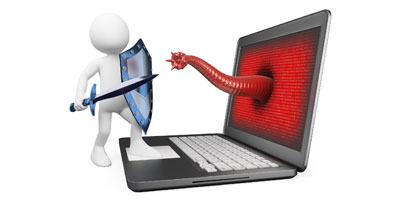Search for a trending topic or for a celebrity and you may end up on a dangerous site. That’s because the bad guys will use every trick in the book in their efforts to infect your computer. And latching on to trending topics and celebrity names is a very efficient means of luring unsuspecting people to malware spreading sites.
Intel Security has been studying this phenomenon for the past 9 years now. Each year, the security company reveals a list of the most dangerous celebrities to search for online. All the celebrity names on this list have a high risk of leading to viruses and malware.
The link between celebrity searches and security threats
“With today’s busy culture and a desire for real time information, consumers often click on sites that will quickly provide them with news and entertainment, without considering safety and security implications,” said Stacey Conner, online safety expert at Intel Security. “Cybercriminals leverage this need for immediacy by encouraging people to visit unsafe sites that can steal private data.”
“Celebrity names combined with the terms ‘free MP4, ‘HD downloads,’ or ‘torrent’ are some of the most searched terms on the Web,” Conner continued. “When consumers search for music that is not made available through legitimate channels, they put both their digital lives and devices at risk.”
Last year’s #1 isn't even in the Top 10

Last year, it was talk show host Jimmy Kimmel who took the top spot on Intel Security’s list of most dangerous celebrities to search for online. This year, Kimmel isn’t even in the top 10. He’s dropped down to the 26th spot, the same as Melissa McCarthy. The top spot in 2015 goes to…
Top 10 Most Dangerous Celebrities of 2015
10. Nina Dobrev, Bulgarian Canadian actress and model who is best known for playing Elena Gilbert on The Vampire Diaries supernatural drama TV series.

9. Lorde, the New Zealand singer and songwriter that sings Royals.
8. Betty White, the American actress, comedienne, author, producer, radio host, singer, and television personality that’s been in show business longer than I’ve been alive.

7. Amy Schumer, stand-up comedian, actress, writer, and star of the Trainwreck movie.

6. Katy Perry, the internationally renowned singer that’s everywhere I look.

5. Jay Z, the American rapper, record producer, and entrepreneur who recently made the news because he is trying to relaunch the failing music streaming service Tidal.

4. Britney Spears, the American singer and actress who won Favorite Pop Artist at the 40th People's Choice Awards.

3. Usher, American singer, songwriter, dancer, and actor who played a major part in launching Justin Bieber’s career. Justin Bieber by the way, is no. 11 on the list.
2. Luke Bryan, an American country music singer and songwriter.

1. Armin van Buuren, the Dutch trance music producer, DJ and radio personality.

About 1 in 5 results lead to malicious sites
Intel Security found that if you combine the search query “Armin van Buuren” with with the terms "free MP4,” “HD downloads,” or “torrent”, your chances of landing on a malicious site are about 1 in 5.
Or to put it in other words, about 1 in 5 results will take you to a website that tested positive for online threats, such as spyware, adware, spam, phishing, viruses and other malware.
Advice to help you stay safe
Be cautious! Be cautious with links, websites, and download sources. Don’t click links you got in an unsolicited email or message for example. When you’re looking for information, look for it on reputable, well-known websites. When you want to watch or download videos, don’t visit websites you don’t trust. Pay extra attention when searching for “HD downloads.” This search query is highly prone to lead you to unsafe content, viruses, and malware.
Use security software to keep you safe. Intel Security recommends McAfee WebAdvisor, a security solution that can protect against malicious websites and browser exploits. I say you could use plenty of other alternatives. Like AVG Web TuneUp for example. It has a Site Safety feature that will warn you if you want to access a risky or dangerous website.
Why would Intel Security recommend a McAfee product?
The answer is simple: McAfee is a wholly owned subsidiary of Intel since February 2011. Intel Security is a company that combines the security expertise of McAfee with the innovation, performance, and trust of Intel. Even though the McAfee brand continue to exist, Intel wants to phase it out.
Learn more about Intel Security on its official website.
Intel Security has been studying this phenomenon for the past 9 years now. Each year, the security company reveals a list of the most dangerous celebrities to search for online. All the celebrity names on this list have a high risk of leading to viruses and malware.
The link between celebrity searches and security threats
“With today’s busy culture and a desire for real time information, consumers often click on sites that will quickly provide them with news and entertainment, without considering safety and security implications,” said Stacey Conner, online safety expert at Intel Security. “Cybercriminals leverage this need for immediacy by encouraging people to visit unsafe sites that can steal private data.”
“Celebrity names combined with the terms ‘free MP4, ‘HD downloads,’ or ‘torrent’ are some of the most searched terms on the Web,” Conner continued. “When consumers search for music that is not made available through legitimate channels, they put both their digital lives and devices at risk.”
Last year’s #1 isn't even in the Top 10

Last year, it was talk show host Jimmy Kimmel who took the top spot on Intel Security’s list of most dangerous celebrities to search for online. This year, Kimmel isn’t even in the top 10. He’s dropped down to the 26th spot, the same as Melissa McCarthy. The top spot in 2015 goes to…
Top 10 Most Dangerous Celebrities of 2015
10. Nina Dobrev, Bulgarian Canadian actress and model who is best known for playing Elena Gilbert on The Vampire Diaries supernatural drama TV series.

9. Lorde, the New Zealand singer and songwriter that sings Royals.
8. Betty White, the American actress, comedienne, author, producer, radio host, singer, and television personality that’s been in show business longer than I’ve been alive.

7. Amy Schumer, stand-up comedian, actress, writer, and star of the Trainwreck movie.

6. Katy Perry, the internationally renowned singer that’s everywhere I look.

5. Jay Z, the American rapper, record producer, and entrepreneur who recently made the news because he is trying to relaunch the failing music streaming service Tidal.

4. Britney Spears, the American singer and actress who won Favorite Pop Artist at the 40th People's Choice Awards.

3. Usher, American singer, songwriter, dancer, and actor who played a major part in launching Justin Bieber’s career. Justin Bieber by the way, is no. 11 on the list.
2. Luke Bryan, an American country music singer and songwriter.

1. Armin van Buuren, the Dutch trance music producer, DJ and radio personality.

About 1 in 5 results lead to malicious sites
Intel Security found that if you combine the search query “Armin van Buuren” with with the terms "free MP4,” “HD downloads,” or “torrent”, your chances of landing on a malicious site are about 1 in 5.
Or to put it in other words, about 1 in 5 results will take you to a website that tested positive for online threats, such as spyware, adware, spam, phishing, viruses and other malware.
Advice to help you stay safe
Be cautious! Be cautious with links, websites, and download sources. Don’t click links you got in an unsolicited email or message for example. When you’re looking for information, look for it on reputable, well-known websites. When you want to watch or download videos, don’t visit websites you don’t trust. Pay extra attention when searching for “HD downloads.” This search query is highly prone to lead you to unsafe content, viruses, and malware.
Use security software to keep you safe. Intel Security recommends McAfee WebAdvisor, a security solution that can protect against malicious websites and browser exploits. I say you could use plenty of other alternatives. Like AVG Web TuneUp for example. It has a Site Safety feature that will warn you if you want to access a risky or dangerous website.
Why would Intel Security recommend a McAfee product?
The answer is simple: McAfee is a wholly owned subsidiary of Intel since February 2011. Intel Security is a company that combines the security expertise of McAfee with the innovation, performance, and trust of Intel. Even though the McAfee brand continue to exist, Intel wants to phase it out.
Learn more about Intel Security on its official website.

























